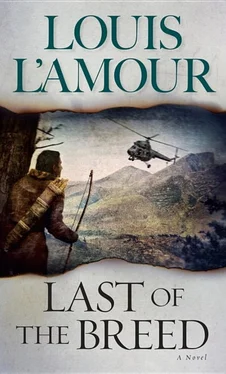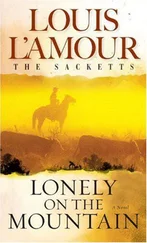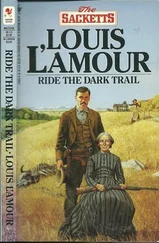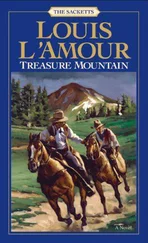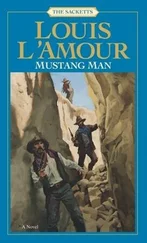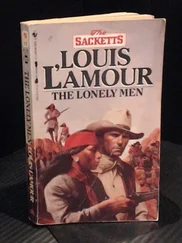Louis L'Amour - Last of the Breed
Здесь есть возможность читать онлайн «Louis L'Amour - Last of the Breed» весь текст электронной книги совершенно бесплатно (целиком полную версию без сокращений). В некоторых случаях можно слушать аудио, скачать через торрент в формате fb2 и присутствует краткое содержание. Город: New York, Год выпуска: 2010, ISBN: 2010, Издательство: Random House Publishing Group, Жанр: Триллер, Историческая проза, Приключения про индейцев, на английском языке. Описание произведения, (предисловие) а так же отзывы посетителей доступны на портале библиотеки ЛибКат.
- Название:Last of the Breed
- Автор:
- Издательство:Random House Publishing Group
- Жанр:
- Год:2010
- Город:New York
- ISBN:978-0-553-89935-1
- Рейтинг книги:3 / 5. Голосов: 1
-
Избранное:Добавить в избранное
- Отзывы:
-
Ваша оценка:
- 60
- 1
- 2
- 3
- 4
- 5
Last of the Breed: краткое содержание, описание и аннотация
Предлагаем к чтению аннотацию, описание, краткое содержание или предисловие (зависит от того, что написал сам автор книги «Last of the Breed»). Если вы не нашли необходимую информацию о книге — напишите в комментариях, мы постараемся отыскать её.
Last of the Breed — читать онлайн бесплатно полную книгу (весь текст) целиком
Ниже представлен текст книги, разбитый по страницам. Система сохранения места последней прочитанной страницы, позволяет с удобством читать онлайн бесплатно книгу «Last of the Breed», без необходимости каждый раз заново искать на чём Вы остановились. Поставьте закладку, и сможете в любой момент перейти на страницу, на которой закончили чтение.
Интервал:
Закладка:
Again Zamatev stared at the map. What a fool he had been not to keep the man in irons. Now all he had done, all he lived for, all he hoped to be, depended on capturing the American.
He stared at the map, stared at the area where he must be. Stared as if his very gaze would make Makatozi emerge from the map in a living presence.
He had to have him. There was no other way. He had to take the American.
There was no time.
Why had Shepilov gone to Magadan?
Why?
Chapter 23
Alekhin was in no hurry. Siberia was a wide land, and the American was walking. To pursue a man effectively, it is best to begin with his thinking.
How did he travel? Where did he sleep? Was he skilled on a trail? What places did he choose when he wished to hide?
What did he eat? If he hunted, how did he hunt? How expert a woodsman was he? How did he cross streams? What did he do to avoid encounters with people? What did he know of the country across which he traveled? What was his eventual destination? Was he liable to alter that destination? What did he plan to do when he arrived there?
These were questions Alekhin asked himself, among many others. Bit by bit, picking up pieces of the trail here and there, he was learning to know Major Joseph Makatozi, and he was enjoying the acquaintance.
In the first place the man was good. Alekhin had never trailed an Indian before, although he had tracked down a few of his own people or other Siberians. The trouble was they were becoming too civilized. The Yakuts, Ostyaks, and others were losing their wilderness skills. They were working in factories, becoming soldiers, living in towns where they could see films and go to places where they could dance the new dances. Only a few of the old ones understood the forest anymore.
Alekhin was not given to introspection. He did not examine his own motives. He was given a job to do and he did it. What became of the man after he was caught he had no idea and did not care. He was a member of the Party, but he did not think about it. He knew little of the philosophy of Communism and cared less. Marx and Engels were but names to him. Lenin was one with whom he could identify, Stalin even more so.
These men and their ideas and accomplishments were far from him. He cared about the forest, but only as a place to live. He did not object to the killing of game or the cutting down of trees. He had no knowledge or thought of the future. The possibility of there being a time when there was no more forest was something he could not imagine. It had always been here; it would always be here. The idea that man could not exist on a planet without forests was completely foreign to him. That trees remove carbon dioxide from air and return oxygen to it would have only made him blink or shrug. The idea was something he could not comprehend and with which he was unconcerned. He gathered wood for his fires, he killed animals to eat, and beyond that he gave them no thought.
For all city dwellers he had only contempt. He had no sense of inferiority concerning anybody or anything. There were spirits in the wilderness, in the trees and mountains, he knew that. Occasionally he appeased them in some minor way. He respected them without thinking of them.
He was as elemental as a beast. He had the strength of a gorilla and the movements of a cat. He thought no more of exercise or training than does a grizzly bear or a tiger. His strength had been born into him, and he used it constantly.
When Zamatev said he wanted the American alive, Alekhin was only half listening. Alive or dead did not matter, although it was often less trouble simply to kill them and save himself the trouble of getting them back to a highway or a railroad.
As for taking the American alive, Alekhin had his doubts. The American was revealing himself in his trail. He had also revealed something of himself in the helicopter incident. The only puzzling question to Alekhin was why the American had not killed Peshkov. He’d had him cold.
Alekhin had read the tracks easily enough. The American had had him and let him go, and Peshkov had immediately informed on him. So the American was a bit of a fool.
Not entirely a fool. That would be dangerous thinking, but he had hesitated to kill.
Alekhin wasted no time thinking of motivations. One did what was necessary, and it had been necessary for the American to kill Peshkov.
The American would not be easily taken. Cornered, he would fight, and Alekhin would have to kill him.
He would have no choice.
Those soldiers were as much to protect the prisoner when captured as they were to assist him. So if necessary he might have to kill them, too.
On the third day after Joe Mack’s passing, Alekhin and his soldiers came to the shack of the big young woman with the blue eyes. She knew nothing, had seen nothing.
Her manner was brusque, and one of the soldiers did not like it. “I shall come back,” he said, “and question you further.”
“Bah!” she said contemptuously.
He started back, and Alekhin stopped him with a sharp order. “Do not be a fool! She would take your rifle from you and spank you with it. She cares nothing for you or your uniform.”
The soldier grumbled, and Alekhin said, “Look around you. This is where she lives. Could you live here? You would starve. You would die in the cold. Women like that you leave alone, or speak to politely, very politely.”
The soldier continued to mutter, and Alekhin said, “If we had the time I’d let you go back, just to see the fun. And if you continue to grumble, I’ll send you back.”
Alekhin found a camp on the slope of Mount Konus, A bed of spruce boughs, the remains of a small fire, a corner of a birchbark dish that had not quite burned, although left in the fire. On the side of the part of the dish that remained, he saw a tea leaf.
So he had tea? Where had he gotten that? Or had he brought it from that so-called village?
The trail away led down into a grim and awful gorge, cluttered with fallen trees, broken boulders, scree, and great slabs of rock, much of it overgrown with thick green moss that was treacherous underfoot. Much of it was easy walking but deceptive, as under some of the moss there was ice formed from moisture that had seeped through to the rock slab beneath and frozen. A misstep and a man’s feet shot from under him. A bad fall at any time and death if it happened on the brink of a cliff.
It was slow going, hand work as much as with the feet, and the soldiers were frightened. They were Russians, peasant boys from the flat country, with the exception of one who was from a city.
The American had gone this way and left no sign. Almost none. Alekhin found a place where he had rested his hand in getting past a tight corner of cliff. He found a partial print of an unty, a moccasin.
The trail was descending steeply down from the mountain. Every step must be taken with care. A half mile further down, Alekhin found a place where the American had slipped; moss had skidded under his foot, leaving a telltale bare spot where the ice had frozen again.
How far ahead? Alekhin studied the spot and then shrugged. Maybe two days. They were gaining on him.
He was positive now that the American was going north and east. He was planning on trying to cross the Bering Strait.
He would have no chance there. The area was patrolled and covered by radar. Simply no chance at all. Yet the American was no fool, and he was going that way.
Desperate? No other way out? He was a flyer, and yet he had made no move toward an airport where he might steal a plane. The word was that he could fly anything.
Alekhin was irritated by the soldiers. They moved too slowly. Not being woodsmen, they took special care, and it was well they did, for they were clumsy in the forest.
Читать дальшеИнтервал:
Закладка:
Похожие книги на «Last of the Breed»
Представляем Вашему вниманию похожие книги на «Last of the Breed» списком для выбора. Мы отобрали схожую по названию и смыслу литературу в надежде предоставить читателям больше вариантов отыскать новые, интересные, ещё непрочитанные произведения.
Обсуждение, отзывы о книге «Last of the Breed» и просто собственные мнения читателей. Оставьте ваши комментарии, напишите, что Вы думаете о произведении, его смысле или главных героях. Укажите что конкретно понравилось, а что нет, и почему Вы так считаете.
